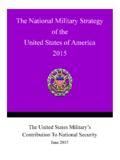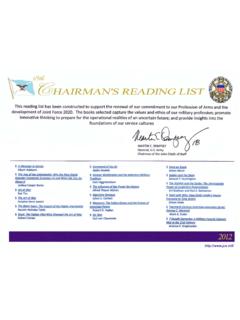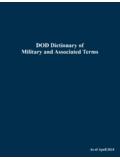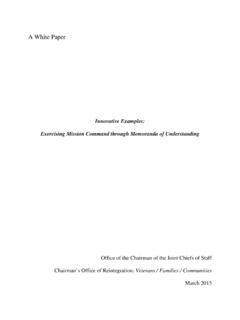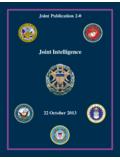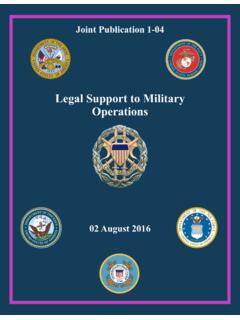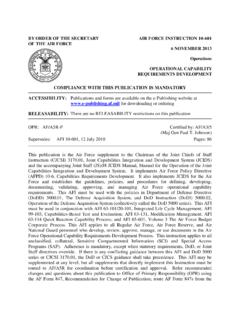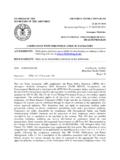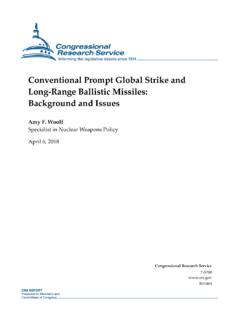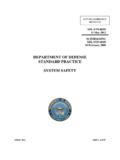Transcription of JP 4-08, Logistics in Support of Multinational …
1 DEPAOTMENTFTHEARMY EUNITEDSTATSOAFAMERICRTHISWE'LLDEFENDJ oint Publication 4-08 Logistics in Support ofMultinational Operations5 July 2017 i PREFACE 1. Scope This publication provides joint doctrine to plan, execute, and assess Logistics in Support of the Armed Forces of the United States during Multinational operations. 2. Purpose This publication has been prepared under the direction of the Chairman of the Joint Chiefs of Staff (CJCS). It sets forth joint doctrine to govern the activities and performance of the Armed Forces of the United States in joint operations, and it provides considerations for military interaction with governmental and nongovernmental agencies, Multinational forces, and other interorganizational partners. It provides military guidance for the exercise of authority by combatant commanders and other joint force commanders (JFCs), and prescribes joint doctrine for operations and training. It provides military guidance for use by the Armed Forces in preparing and executing their plans and orders.
2 It is not the intent of this publication to restrict the authority of the JFC from organizing the force and executing the mission in a manner the JFC deems most appropriate to ensure unity of effort in the accomplishment of objectives. 3. Application a. Joint doctrine established in this publication applies to the Joint Staff, commanders of combatant commands, subordinate unified commands, joint task forces, and subordinate components of these commands, the Services and combat Support agencies. b. The guidance in this publication is authoritative; as such, this doctrine will be followed except when, in the judgment of the commander, exceptional circumstances dictate otherwise. If conflicts arise between the contents of this publication and the contents of Service publications, this publication will take precedence unless the CJCS, normally in coordination with the other members of the Joint Chiefs of Staff, has provided more current and specific guidance.
3 Commanders of forces operating as part of a Multinational (alliance or coalition) military command should follow Multinational doctrine and procedures ratified by the United States. For doctrine and procedures not ratified by the US, commanders should evaluate and follow the Multinational command s doctrine and procedures, where applicable and consistent with US law, regulations, and doctrine. For the Chairman of the Joint Chiefs of Staff: KEVIN D. SCOTT Vice Admiral, USN Director, Joint Force Development Preface ii JP 4-08 Intentionally Blank iii SUMMARY OF CHANGES REVISION OF JOINT PUBLICATION 4-08 DATED 21 FEBRUARY 2013 Updates information on the joint Logistics environment in Multinational operations.
4 Updates Multinational Logistics principles. Updates supply operations for Logistics capabilities. Revises operational contract Support and national security element to accurately reflect extant capabilities and processes. Deletes Multinational Logistics planning by operation phase. Adds pre-deployment planning to Multinational Logistics planning. Updates Appendix A Commander's Checklist for Logistics in Support of Multinational Operations. Updates Appendix C Relevant Legal Authorities for United States Logistics in Support of Multinational Operations. Revises and updates Appendix D United States Contracting Considerations in Multinational Operations. Summary of Changes iv JP 4-08 Intentionally Blank v TABLE OF CONTENTS EXECUTIVE SUMMARY .. vii CHAPTER I OVERVIEW Introduction .. I-1 Multinational Logistics .. I-2 The Joint Logistics Environment in Multinational Operations .. I-4 Logistics Imperatives.
5 I-6 Multinational Logistics Principles .. I-7 Special Considerations in Organizing and Conducting Multinational Logistic Operations .. I-9 CHAPTER II Multinational LOGISTIC CAPABILITIES Introduction .. II-1 Supply .. II-1 Maintenance Operations .. II-3 Deployment and Distribution .. II-3 Joint Health Services .. II-5 Engineering .. II-8 Logistic Services .. II-10 Operational Contract Support .. II-11 CHAPTER III Multinational LOGISTIC PLANNING Introduction .. III-1 Planning Considerations .. III-2 III-4 CHAPTER IV EXECUTING Multinational Logistics Introduction .. IV-1 Multinational Logistics Execution .. IV-1 Transitioning to a Multinational Operation .. IV-2 CHAPTER V COMMAND AND CONTROL Introduction .. V-1 Authorities and Responsibilities .. V-2 Control and Coordination Models .. V-4 Table of Contents vi JP 4-08 APPENDIX A Commander s Checklist for Logistics in Support of Multinational Operations .. A-1 B Alternative Formats for Logistics Annex to Multinational Operation Plan.
6 B-1 C Relevant Legal Authorities for United States Logistics in Support of Multinational Operations .. C-1 D United States Contracting Considerations in Multinational Operations .. D-1 E References .. E-1 F Administrative Instructions .. F-1 GLOSSARY Part I Abbreviations, Acronyms, and Initialisms .. GL-1 Part II Terms and Definitions .. GL-4 FIGURE I-1 Selected Multinational Operations .. I-3 I-2 Logistics Principles of Multinational Operations .. I-8 I-3 Logistics -Related Characteristics of Types of Multinational Operations .. I-12 III-1 United States and North Atlantic Treaty Organization Classes of Supply .. III-6 III-2 Key Multinational Force Commander Tasks During Deployment Planning .. III-13 III-3 Key Multinational Force Commander Tasks During Sustainment Planning .. III-15 III-4 Key Multinational Force Commander Tasks During Redeployment/Termination Planning .. III-16 V-1 Illustrative Multinational Joint Logistic Center Structure.
7 V-5 V-2 Illustrative Logistic Command and Control Organization: Alliance-Led Multinational Operation .. V-7 V-3 Illustrative Logistic Command and Control Organization: Multinational Operation .. V-8 V-4 Illustrative Logistic Command and Control Organization: United Nations-Commanded Multinational Operation .. V-10 vii EXECUTIVE SUMMARY COMMANDER S OVERVIEW Provides an Overview of Multinational Logistics Discusses Multinational Logistic Capabilities Explains Multinational Logistic Planning Covers Executing Multinational Logistics Addresses Command and Control of Multinational Logistics Overview of Multinational Logistics Introduction When participating in Multinational operations, US forces will comply with international agreements signed by the US. Logistic Support during Multinational operations differs from unilateral joint operations in that the participating nations represent different national and military objectives, cultures, and approaches to logistic Support .
8 This impacts how the US organizes, prepares, and executes logistic Support during Multinational operations. A significant challenge in Multinational Logistics (MNL) involves establishing effective command and control (C2) processes that are acceptable to all troop contributing nations. Logistics is a Service and national responsibility, and under a North Atlantic Treaty Organization (NATO) operation, it is deemed a collective responsibility. Multinational Logistics (MNL) MNL is any coordinated logistic activity involving two or more nations supporting a Multinational force (MNF) under the auspices of an alliance or coalition. This includes operations conducted under a United Nations mandate. MNL includes activities involving both logistic units provided by participating nations designated for use by the Multinational force commander (MNFC), as well as a variety of MNL Support arrangements that may be developed and used by participating Joint Logistics Environment in Multinational Operations The joint Logistics environment exists within this operational environment and consists of the conditions, circumstances, and influences that affect the employment of logistic capabilities.
9 MNL is bound together by a web of relationships Executive Summary viii JP 4-08 among global logistic providers, supporting and supported organizations and units, and other entities. The key global providers for the US are the Services, the Defense Logistics Agency, and US Transportation Command. Logistics Imperatives The value of Logistics can be determined by how well the force is deployed and sustained. Three logistic imperatives help determine this: unity of effort, joint Logistics enterprise-wide visibility, and rapid and precise response.
10 MNL Principles The principles of Logistics for US joint operations, described in Joint Publication 4-0, Joint Logistics , also apply to the Logistics of Multinational operations. However, because participating forces represent sovereign nations, there are several unique principles for MNL operations. They are: collective responsibility, authority, primacy of operational requirements, cooperation, coordination, assured provision, sufficiency, efficiency, flexibility, visibility and transparency, synergy, simplicity, and timeliness. Special Considerations in Organizing and Conducting Multinational Logistic Operations The planning and conduct of Logistics in operations involving multiple sovereign nations characteristically differs from that in unilateral operations. Special considerations include the impact of national sovereignty; the US as provider and recipient of logistic Support ; differences in MNL based on organizational structure; impact on MNL by type of operation; stability activities; force protection; MNL in a chemical, biological, radiological, and nuclear environment; limits to using MNL; and cyberspace operations.


